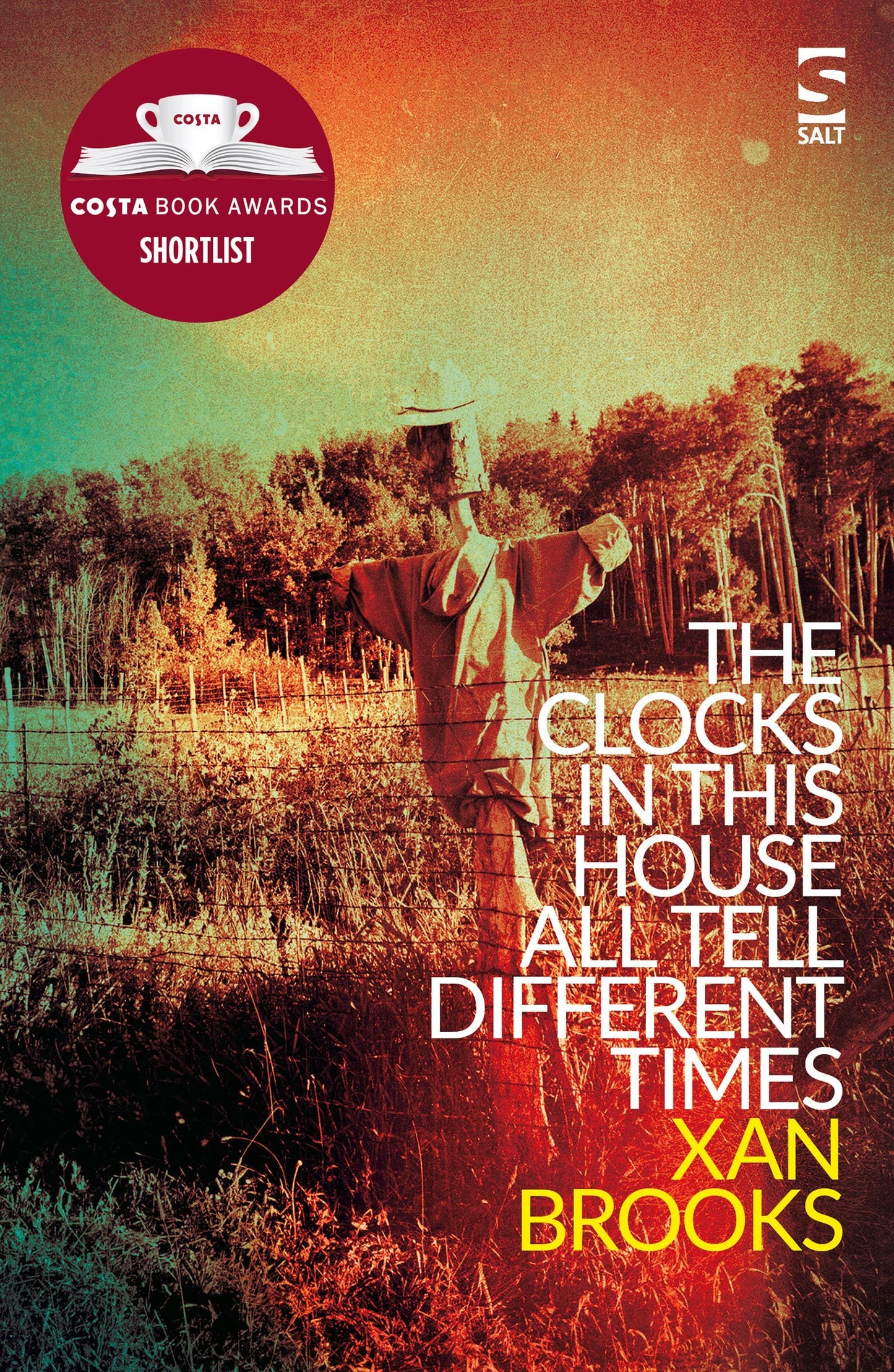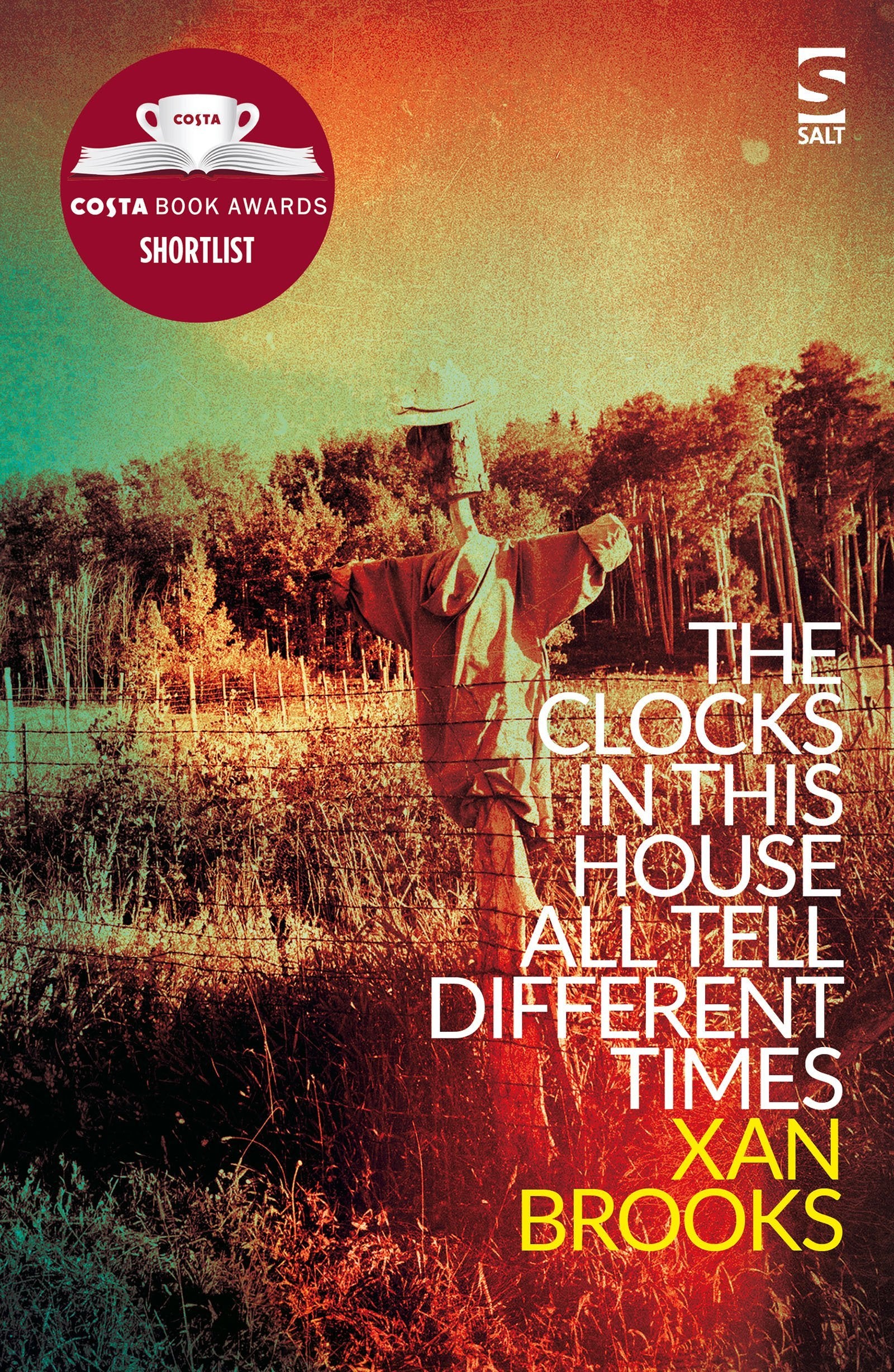Xan Brooks
The Clocks in This House All Tell Different Times
The Clocks in This House All Tell Different Times
SKU:9781784630935
Couldn't load pickup availability
Synopsis

Shortlisted for the Authors’ Club Best First Novel Award 2018
Shortlisted for the 2017 Costa First Novel Award
Longlisted for the Desmond Elliott Prize 2018
Longlisted for The Walter Scott Prize for Historical Fiction 2018
New Faces of Fiction 2017, Observer
Observer Fiction to look out for in 2017
The Irish Times What To Look Out for in 2017 from Independent Publishers
Jen Campbell’s ‘Most Anticipated Books of 2017’
Jean Bookish Thoughts ‘Most Anticipated Releases of 2017’
A dark social-realist fairytale, spotlighting the shadowy underside of 1920s England
Summer 1923: the modern world. Orphaned Lucy Marsh climbs into the back of an old army truck and is whisked off to the woods north of London – a land haunted by the past, where lost souls and monsters conceal themselves in the trees.
In a sunlit clearing she meets the ‘funny men’, a quartet of disfigured ex-soldiers named after Dorothy’s companions in The Wonderful Wizard of Oz. Here are the loved and the damaged, dark forests and darker histories, and the ever-present risk of discovery and violent retribution. Xan Brooks’ stunning debut is heartbreaking, disturbing and redemptive.
Praise for this Book
‘The assurance and skill with which Xan Brooks tells his tale in The Clocks in This House All Tell Different Times makes it difficult to believe that this is a first novel. By turns funny and tragic, awful and lovely, terrifying and warming, it’s a book told with rare elegance and narrative zest. The post-Great War England the novel depicts is a land of exhausted decay and weird encounters, filled with fake spiritualists, war heroes turned into monsters, and repulsive aristocrats. Its twisted humour and dark satire reminded me above all of Graham Greene, and that is not a comparison one makes lightly. I absolutely loved it.’ —Lloyd Shepherd, author of The English Monster
Reviews of this Book
‘Observer Fiction to look out for in 2017 The Clocks in This House All Tell Different Times (Salt) by Xan Brooks – a fairytale wrapped within a historical novel, it’s as quixotic and dreamlike as Ishiguro’s The Buried Giant.’ —Alex Preston, author of In Love and War
‘Thrilling, disturbing and somehow very funny … a bold, ambitious, weird novel with a lot of foliage to get lost in’ —Hannah Jane Parkinson, Observer
‘A book with heart and soul that is original, penetrative and engaging. It should be relished by every discerning reader.’ —Jackie Law, Never Imitate
‘Philly Malicka enjoys a strange fable about drugs. jazz and the scars of the Great War ... The year is 1923 and the trauma of the First World War has left Britain misshapen. Part of society hopes for social change, while others, ossified, look backward. This dark, magical tale explores the chasm between the two, and how a nation ravaged by “the storms of the things they once did, the people they once were” seeks redemption.’ —Philly Malicka, The Telegraph
‘Genuinely amazing: quirky, thought-provoking, a wonderful read.’ —Anne Goodwin
‘The Pink Earl’s stately home, where the clocks all tell different times, may be a relic from a vanished past, but the future is massively present there – and it’s the one we recognise, in which everyone is “embarked on their own adventure” and in which the rhetoric of constant change at one level disguises the perpetuation of entrenched power at another.’ —M. John Harrison, The Guardian
‘This will be familiar to fans of Decline And Fall. But what Evelyn Waugh treated satirically isn’t so funny any more, and this well-written novel is more tender and sad than bitingly hilarious.’ —Fanny Blake, Daily Mail
‘With its finely judged atmosphere of tainted innocence, Brooks’s novel frames the real horrors of post-conflict trauma as episodes of near-fairytale jeopardy: the grown-up terrors in the dark wood and the poisonous intoxications of the great house are trials in which his heroine’s strength of character is forged. As in fairy stories, the happy-ever-after consists of the simplest of fulfilled desires: a home, work, a family: love as ordinary and essential as bread.’ —Jane Shilling, Evening Standard
‘The novel is a rich tapestry that interweaves the social fabric of interwar England with fairy tale touches. Lucy comes to feel that “the world is confusing, but the forest is not”, poignantly conveying the strangeness of the period. The author has a fabulously visual style, and I loved the ensemble of characters - some haunted, some scarred, all of them nimbly conjured by a debut author with considerable talent.’ —Joanne Owen, Lovereading
‘The opening section and the overall premise of Xan Brooks’s debut novel is fascinating. Taken away from the pub she lives in with her grandfather for the afternoon, orphaned Lucy Marsh goes into the woods to meet ‘the funny men’. Alongside four other young people whose life circumstances have left them equally vulnerable, Lucy goes for a picnic with these funny men who she will soon know as The Tin Man, Toto, the Scarecrow, and The Lion. It doesn’t take a genius to realise that there is something sinister about five pre-teen children being taken to the woods to meet with four men who disguise themselves as characters from a children’s classic, but Brooks does a fantastic job of drip-feeding us the necessary information until we come to see the true nature of these interactions and realise that the ‘funny men’ are actually traumatised war veterans no longer comfortable in the real world.’ —Bookmunch
‘I don’t know what I was expecting going in to this book, but honestly what I got wasn’t anything like I imagined. Trying to explain what this book was is difficult – because honestly it’s very unlike anything I’ve ever read before. It was absolutely mesmerising, but also quite an uncomfortable read in places, and I really enjoyed it.’ —Ashleigh’s Bookshelf
‘Brooks writes stunningly and paints a dark, imaginative picture so vivid I could see it made into a film.’ —Caz Roberts, Grazia
‘Set after the first world war, is a macabre and unsettling tale of a young girl who is made a plaything of the “funny men”, a group of damaged soldiers, so badly injured they have removed themselves from the world completely. The novel has a woozy, tainted fairytale quality – Brooks calls these molten men of his the Tin Man and the Scarecrow – and a heightened aspect, like looking at the world through a cracked magnifying glass. It’s a bizarre, horror-flecked novel, pleasingly distinctive in its oddness.’ —Natasha Tripney, Observer
‘Whilst this is essentially about an alternate coming of age, set at a time when people are trying to adjust and cope post war, there is focus on living to excess, without care for the consequences and how for some, non-conformity is embraced. There is rising tension and dense escalating drama running through the story. There is offset by some limited and subtle dark humour. But in all, people are trying to make sense of the world and deal with the fall out of war. The perspectives of the soldiers with life changing injuries is unforgettable. The characters are strong, bold and intriguing. But ultimately we are all vulnerable, and perhaps there is a deeper thread about how we choose to live despite such vulnerability whilst also being true to ourselves.’ —Sara Garland, Nudge Magazine
‘A stunning, beautifully written debut by Xan Brooks … A masterful first novel.’ —Sophie Raworth, Read by Raworth


